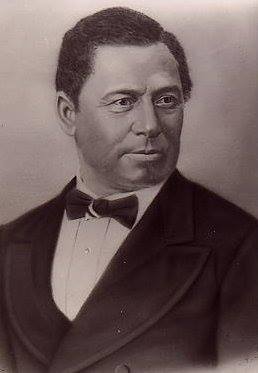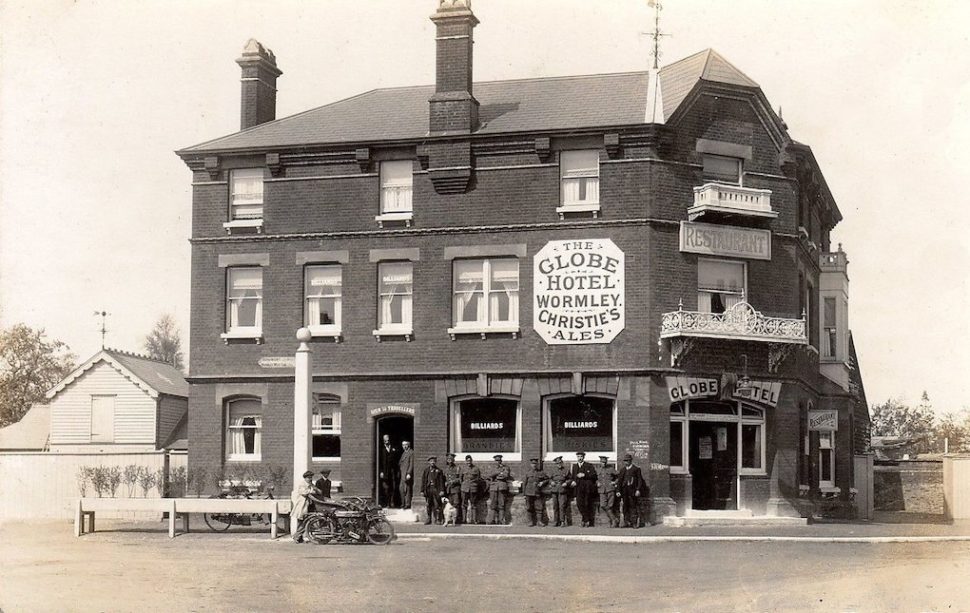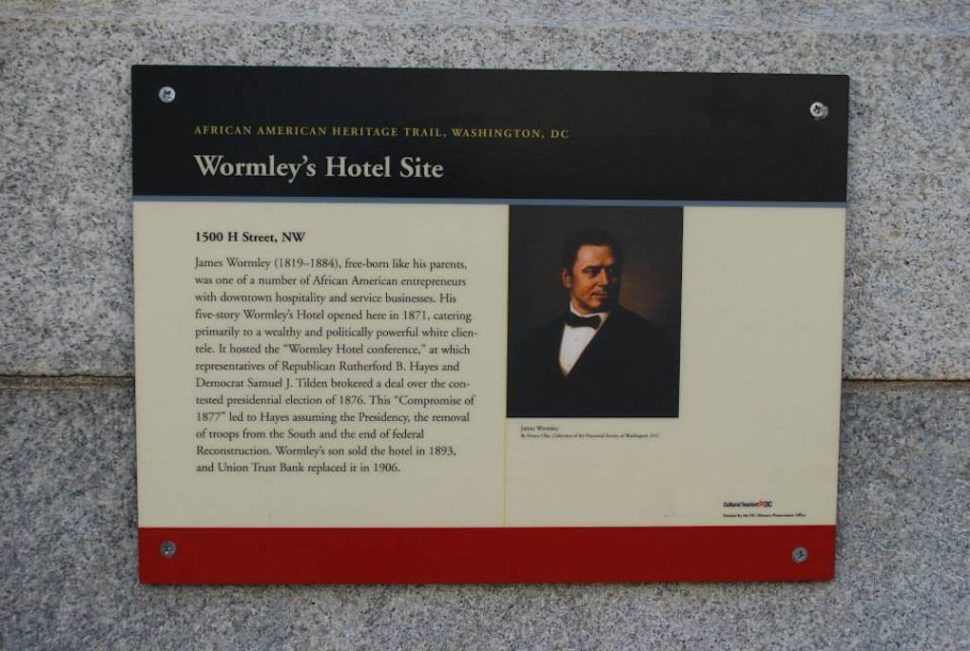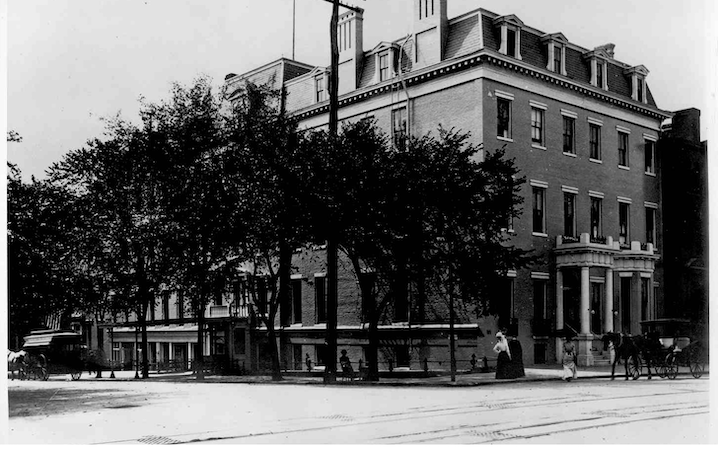African Americans have played a major role in Washington, D.C. becoming the city it is. During the Civil War and Reconstruction periods, the capital began to experience an influx of Black families. Although D.C. would not become known as “Chocolate City” until the 1950s, this influx led to it having a greater percentage of Black residents than any other major U.S. city at the time.
During this time, D.C. also saw many Black firsts. Slavery was abolished in Washington, D.C. in 1862, nine months before it was ended in the rest of the United States. Black men were given the right to vote in 1867, three years before Black men across the country. The capital saw its first Black municipal office holder in 1868, and the country’s first Black public high school in 1870.
It was a period of Black progress as African Americans created schools, churches, and businesses. One such business was the Wormley Hotel, which many believe to be D.C.’s first integrated hotel.

The Wormley entrepreneurial legacy
The Wormley Hotel was a first-class establishment, serving as a hub for local and foreign government officials doing business in the capital. In fact, it became the most upscale and popular hotel in all of Washington, D.C.
In dialogue found within Gore Vidal’s historical novel, 1876, one character, Miss Augustine Snead, says, “Most European royalty stay at Wormley’s Hotel. Why haven’t you, Princess?” Another, Mrs. Day, asks, “Why aren’t you at Wormley’s? It’s the only nice place, really.”
For James Wormley, entrepreneurship and enterprise ran in his blood. His father, Lynch Wormley, started off as a hackney carriage driver, which in the early 1800s, was one of the few ways for a Black man to have his own business. Lynch was soon running his own delivery stable, delivering messages to influential businessmen and government officials. This put him in a position that afforded him many opportunities.
Eventually, Lynch Wormley was able to purchase several pieces of property on I Street between Fifteenth and Sixteenth Streets, NW. According to Carol Gelderman, author of A Free Man of Color and His Hotel, “By the mid-century Lynch Wormley owned so much property on I Street that the alley behind it became known as Wormley Alley.”

He also owned properties in other locations around Washington, D.C., including the Liberia Hotel.
Lynch Wormley’s entry into the hotel business no doubt inspired his son, who would grow up to establish the legendary Wormley Hotel. His success and business-savvy set the stage and paved the way for James.
James Wormley early years
On January 16, 1819, James, the second-eldest of ten children, was born to Lynch and Mary Wormley in Washington, D.C. James began attending an exclusive school for children of color when he was five.
He married Anna Elizabeth Thompson when they were both 17. They had four children: William Henry Ashburton Wormley, James Thompson Wormley, Garrett Smith Wormley, and Anna Matilda Wormley.
James worked as a boat steward to support his family while Anna ran a confectionary. Sometime in the early 1850s, James, opened a catering business on I Street, right next door to Anna’s confectionary.
Like his father, James found himself serving men of influence, primarily politicians staying in the city while Congress was in session, as well as the personnel that accompanied them to assist them in conducting their business. James supplied them all with breakfast and dinner, delivered to whichever hotel or boarding house they were staying in.
James became well-known and highly sought after for his delicious food and reliable service. His patrons knew him as a charismatic, witty, and respectable gentleman who was as handsome as he was debonair. His catering business was so lucrative that James was eventually able to open a restaurant and buy several I Street boarding houses of his own.
According to Gelderman, “An ad, which ran regularly in Washington’s papers, cited, ‘Wormley’s Celebrated Dining Rooms at Nos. 310, 314, 318, and 320 I Street, between Fifteenth and Sixteenth Streets.'”
“The hotel began as a row of houses used as boarding houses before the Civil War,” Donet Graves, ESQ told Travel Noire. “The [hotel] image you see in photos is of a building brought into the enterprise in 1869. Thereafter, the houses became the Annex with the larger structure as the main building.”

The impact of James Wormley and the Wormley Hotel
The Wormley Hotel is also known for being the location of an important historical conference and its resulting agreement named for the hotel. Following the disputed, fraud-ridden 1876 Tilden-Hayes presidential election, Democrats and Republicans secretly convened at the Wormley Hotel for what became known as the Wormley Conference. Several discussions were held between leaders from both parties, and ultimately, an agreement known as the Compromise of 1877, or the Wormley Agreement, was reached.
As part of the agreement, the Democrats conceded the presidency to the Republicans and Rutherford B. Hayes became the 19th president of the United States. In return, the Republicans withdrew the remaining federal troops from the South and ceased their involvement in Southern affairs.
This event marked the beginning of the end of the Reconstruction era. It is both ironic and sad that it took place in the establishment of a Black man who had achieved so much and grown so successful under the changing climate of Reconstruction reform.
In addition to a famed hotelier, James Wormley had been an advocate for Black children’s education. In 1871 he was instrumental in the creation of the Sumner School, Washington, D.C.’s first public elementary school for Black children. He later served as the chairman of a group of individuals working to build another elementary school for Black students in D.C.’s Georgetown neighborhood.
James became ill in 1884 and underwent surgery for kidney stones. Three days later, on October 18, he passed away. Other Washington hotels showed their respect by flying their flags at half mast. Newspapers nationwide published obituaries for James, lauding his contributions and work.
“When James died in 1884, the business was continued by his sons, primarily James T. Wormley,” Graves explained.
James Wormley left his family a fortune of $150,000, the equivalent of almost $4 million today. The school he had been working to form in Georgetown, opened the following year and was named the Wormley School.
Wormley’s son sold the hotel in 1893, and it was replaced by Union Trust Bank in 1906. There is a marker for the hotel site along D.C.’s African American Heritage Trail
Related: Henderson Travel Service: The First And Oldest Black-Owned Travel Agency in America





